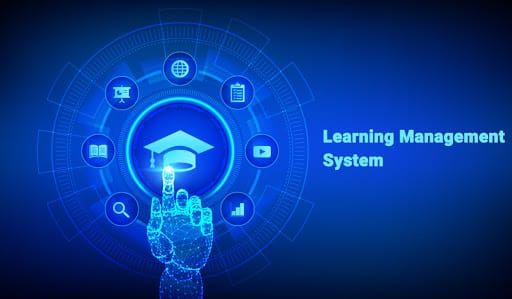Many aspects of education are shifting towards digital outlets. With various options on the market, it is important for educational stakeholders to develop an understanding of the types of products available. When district and school leaders are surveying options for new software, two main categories are Learning Management Systems (LMS) and Assessment Management Platforms (AMP). The search can get confusing when the line between the two products blurs. This article will help stakeholders understand the difference between the two platforms to carefully decide which best fits their needs.
What is a Learning Management System?
Learning management systems are web-based software developed to create, deliver, and manage instructional materials. Using an LMS, educators can easily create engaging online lessons, modules, and seminars for students to work through in person or remotely. Learning management systems can often have assessment components but are most used for online curriculum planning and implementation.

What are the Key Features of Learning Management Systems?
Every LMS on the market will bring unique features to the table. However, there are certain commonalities that bring purpose to learning management systems across the board. Some of those features include:
- Planning and Mapping Curriculum: Learning management systems can act as incredible tools when it comes to planning and mapping out curriculum. Educators can use LMS to build modules and lessons in their online classroom. These can be reviewed with students or completed independently from a remote location.
- Conducting Engaging Online Lessons: Learning management systems offer engaging resources to conduct online lessons in the classroom or remotely! With tools like video calling, buildable lessons, interactive whiteboards, and access to external links, learning management systems make engaging students a breeze!
- Tracking Grades and Progress: Most learning management systems have a built-in gradebook to record and track student progress. Any assignment conducted within the platform will document itself. Educators can also create custom grading columns and manually input data from classroom activities. LMS take traditional gradebooks and modernize them with a digital touch.

What is an Assessment Management Platform?
Assessment management platforms are comprehensive online tools that allow educators to evaluate their students’ skills and competencies. Rather than focusing on pedagogy as a whole, digital assessment platforms put all their resources into making the online assessment process as personalized, impactful, productive, and timesaving as possible. The assessment features that AMPs come equipped with are way more extensive, comprehensive, adaptable, and in depth than what you would find in a LMS. Assessment management platforms offer a secure, engaging, and customizable way for educators to take assessments to the next level.
What are the Key Features of an Assessment Management Platform?
- Custom, High-Quality Assessments: With features like question authoring, multimedia embedding, and customizing the structure and presentation of questions, assessment management platforms open the door to endless possibilities. Exams will become more relevant, engaging, and easy-to-create than ever while also measuring higher order thinking skills. From labs and simulations to portfolio projects, a high-quality LMS will bring your assessment vision to life.
- AI Proctoring: Learning management systems offer assessment security solutions that are safer than ever before. With AI proctoring, software features validate student’s identities, monitor and flag suspicious cheating behaviors, and keep the contents of the exams private and secure. This is an aspect of AMP that really set them apart.
- Complex Data Reporting: One of the most powerful, practical, and time-saving aspects of assessment management platforms is complex data reporting. This goes beyond a simple gradebook, but rather deep dives into each exam’s data to reveal meaningful insights on student performance. Class-wide and individual student reports reveal areas and competencies that students have been struggling in and what their misconceptions may be. This feature also uses algorithms to create potential small group pairings for groups of students with similar needs. Additionally, AMP can be used for in-depth tracking of students’ progress over time.
- Accessibility Features: Assessment management platforms allow educators to create assessments that adopt to and accommodate students with special needs. A few examples of accessibility features include adding extra time, enabling audio and video transcripts, adjusting color schemes, controlling question fonts, and magnifying images. This can make a world of difference for students with hearing impairments, dyslexia, color blindness, ADHD, and more. Adapting an assessment management platform equipped with accessibility features allows every unique student to unlock their academic potential.
- Accreditation Enabling: Assessment management platforms are well-loved by professional certification programs because they allow for seamless tracking towards accreditation and certification. Many AMP will work with professional programs to create high-quality course exams that measure skills and competencies and track progress over time. The in-depth reporting that accompanies AMP allows individuals to show proof of competency when applying for a certification.
Which Software Works Best for You?
There are many benefits to both learning management systems and assessment management platforms. The decision will come down to what your district or institution’s needs are. It’s important to also note that these two systems are not in competition with each other; Many institutions use learning management systems for instructional purposes and then implement assessment management platforms afterwards to assess learning. Data and feedback provided by the AMP will also help educators make informed instructional decisions to implement on their learning management system. This cycle continues symbiotically to yield highly effective results for educators.
If you are seeking to adopt only one platform, consider whether your needs lie in instructional tools or detailed assessment and data reporting software. If you are looking for a curriculum tool that will help will planning, implementing, and grading lessons, a learning management system will meet your needs. However, if your goal is to implement a comprehensive assessment solution that offers web security, AI proctoring, student accommodations, and easily interpreted data reporting, an assessment management platform is the best choice.
If you are looking for a cutting-edge, high-quality assessment management platform that will meet your assessment needs, SwiftAssess is an incredible option. To speak with a team member about adopting SwiftAssess technology, contact us here.





